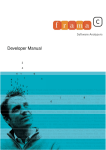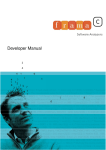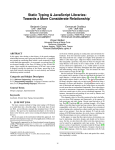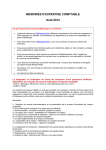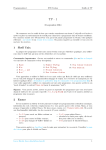Download E-ACSL User Manual - Frama-C
Transcript
E-ACSL User Manual
E-ACSL Plug-in
Release 0.5 compatible with
Frama-C
Sodium
Julien Signoles
CEA LIST, Software Safety Laboratory, Saclay, F-91191
c 2013
CEA LIST
This work has been supported by the `Hi-Lite' FUI project (FUI AAP 9).
CONTENTS
Contents
Foreword
7
1
Introduction
9
2
What the Plug-in Provides
11
2.1
11
2.2
2.1.1
Running E-ACSL
. . . . . . . . . . . . . . . . . . . . . . . . . . . . .
11
2.1.2
Executing the generated code . . . . . . . . . . . . . . . . . . . . . . .
13
Execution Environment of the Generated Code
. . . . . . . . . . . . . . . . .
14
2.2.1
Runtime Errors in Annotations . . . . . . . . . . . . . . . . . . . . . .
14
2.2.2
Architecture Dependent Annotations . . . . . . . . . . . . . . . . . . .
15
2.2.3
Libc
15
2.2.4
Integers
2.2.5
Memory-related Annotations
2.2.6
Runtime Monitor Behavior
. . . . . . . . . . . . . . . . . . . . . . . . . . . . . . . . . . . . .
. . . . . . . . . . . . . . . . . . . . . . . . . . . . . . . . . . .
16
. . . . . . . . . . . . . . . . . . . . . . .
17
. . . . . . . . . . . . . . . . . . . . . . . .
18
Incomplete Programs . . . . . . . . . . . . . . . . . . . . . . . . . . . . . . . .
19
2.3.1
Programs without Main
. . . . . . . . . . . . . . . . . . . . . . . . . .
19
2.3.2
Undened Functions . . . . . . . . . . . . . . . . . . . . . . . . . . . .
20
2.4
Combining E-ACSL with Other Plug-ins . . . . . . . . . . . . . . . . . . . . .
21
2.5
Customization . . . . . . . . . . . . . . . . . . . . . . . . . . . . . . . . . . . .
22
2.6
Verbosity Policy
. . . . . . . . . . . . . . . . . . . . . . . . . . . . . . . . . .
22
2.6.1
Verbosity Level . . . . . . . . . . . . . . . . . . . . . . . . . . . . . . .
22
2.6.2
Message Categories . . . . . . . . . . . . . . . . . . . . . . . . . . . . .
23
2.3
3
Simple Example . . . . . . . . . . . . . . . . . . . . . . . . . . . . . . . . . . .
Known Limitations
25
3.1
Uninitialized Values
. . . . . . . . . . . . . . . . . . . . . . . . . . . . . . . .
25
3.2
Incomplete Programs . . . . . . . . . . . . . . . . . . . . . . . . . . . . . . . .
26
3.2.1
Programs without Main
. . . . . . . . . . . . . . . . . . . . . . . . . .
26
3.2.2
Undened Functions . . . . . . . . . . . . . . . . . . . . . . . . . . . .
27
Recursive Function . . . . . . . . . . . . . . . . . . . . . . . . . . . . . . . . .
27
3.3
5
CONTENTS
3.4
Variadic Functions
. . . . . . . . . . . . . . . . . . . . . . . . . . . . . . . . .
27
3.5
Function Pointers . . . . . . . . . . . . . . . . . . . . . . . . . . . . . . . . . .
27
A Changes
29
Bibliography
31
Index
33
6
Foreword
1
This is the user manual of the Frama-C plug-in E-ACSL . The contents of this document
correspond to its version 0.5 (June 5, 2015) compatible with the version Sodium of Frama-
C [4, 6, 11].
However the development of the E-ACSL plug-in is still ongoing:
features
described here may still evolve in the future.
Acknowledgements
We gratefully thank all the people who contributed to this document: Jens Gerlach, PierreLoïc Garoche, Florent Kirchner, Nikolaï Kosmatov and Guillaume Petiot.
1
http://frama-c.com/eacsl
7
Chapter 1
Introduction
Frama-C [4, 6, 11] is a modular analysis framework for the C language which supports the
ACSL specication language [1]. This manual documents the E-ACSL plug-in of Frama-
C, version 0.5. The E-ACSL version you are using is indicated by the command
-e-acsl-version.
frama-c
This plug-in automatically translates an annotated C program into an-
other program that fails at runtime if an annotation is violated. If no annotation is violated,
the behavior of the new program is exactly the same as the one of the original program.
Such a translation brings several benets. First it allows the user to monitor a C code, in
1
particular to perform what is usually called runtime assertion checking [3] .
This is the
primary goal of E-ACSL. Second it allows the combination of Frama-C and its existing
analyzers, with other analyzers for C like PathCrawler [2] that do not natively understand
the ACSL specication language. Third, the possibility to detect invalid annotations during a
concrete execution may be very helpful while writing a correct specication of a given program,
e.g. for later program proving. Finally, an executable specication makes it possible to check
assertions that cannot be veried statically at runtime and thus to establish a link between
monitoring tools and static analysis tools like Value [7] or Wp [5].
Annotations must be written in the E-ACSL specication language [14, 8] which is a subset
of ACSL. This plug-in is still in a preliminary state: some parts of E-ACSL are not yet
supported. E-ACSL annotations currently handled by the E-ACSL plug-in are documented
in a separated document [15].
This manual does not explain how to install the plug-in. Please have a look at le
INSTALL of
the E-ACSL tarball for this purpose. Also this manual is not a full tutorial about Frama-C
and E-ACSL, even if it provides some examples. You can still refer to any external tutorial [13]
for additional examples.
1
In our context, runtime annotation checking would be a better more-general expression.
9
Chapter 2
What the Plug-in Provides
This chapter is the core of this manual and describes how to use the plug-in. You can still call
the option
-e-acsl-help
to get the list of available options with few lines of documentation.
First, Section 2.1 shows how to run the plug-in on a toy example and how to compile the
generated code with a standard C compiler and to detect invalid annotations at runtime.
Then, Section 2.2 provides additional details on the execution of the generated code. Next,
Section 2.3 focuses on how to deal with incomplete programs, i.e. in which some functions
are not dened or in which there are no main function. Section 2.4 explains how to combine
the E-ACSL plug-in with other Frama-C plug-ins. Finally, Section 2.5 introduces how to
customize the plug-in, and Section 2.6 details the verbosing policy of the plug-in.
2.1
Simple Example
This Section is a mini-tutorial which explains from scratch how to use the E-ACSL plug-in
to detect at runtime that an E-ACSL annotation is violated.
2.1.1 Running
E-ACSL
Consider the following simple program in which the rst assertion is valid while the second
one is not.
File rst.i
i n t main( void )
i n t x = 0;
{
/∗@ a s s e r t x == 0 ;
/∗@ a s s e r t x == 1 ;
}
return
0;
∗/
∗/
Running E-ACSL on this le just consists in adding the option
-e-acsl
to the Frama-C
command line:
frama
$
-c -e - acsl first .i
[ kernel ] Parsing FRAMAC_SHARE / libc / __fc_builtin_for_normalization .i ( no preprocessing )
[ kernel ] Parsing FRAMAC_SHARE /e - acsl / e_acsl .h ( with preprocessing )
[ kernel ] Parsing FRAMAC_SHARE /e - acsl / e_acsl_gmp_types .h ( with preprocessing )
[ kernel ] Parsing FRAMAC_SHARE /e - acsl / e_acsl_gmp .h ( with preprocessing )
[ kernel ] Parsing FRAMAC_SHARE /e - acsl / memory_model / e_acsl_mmodel_api .h ( with preprocessing )
[ kernel ] Parsing FRAMAC_SHARE /e - acsl / memory_model / e_acsl_bittree .h ( with preprocessing )
[ kernel ] Parsing FRAMAC_SHARE /e - acsl / memory_model / e_acsl_mmodel .h ( with preprocessing )
[ kernel ] Parsing first . i ( no preprocessing )
[e - acsl ] beginning translation .
[e - acsl ] translation done in project "e - acsl ".
11
CHAPTER 2. WHAT THE PLUG-IN PROVIDES
Even if
first.i is already preprocessed, E-ACSL rst asks the Frama-C kernel to preprocess
first.i several les which form the E-ACSL library. Their usage will be
and to link against
explained later, mainly in Section 2.2.
Then E-ACSL takes the annotated C code as input and translates it into a new Frama-C
project named
e-acsl1 .
By default, the option
-e-acsl does nothing more.
It is however pos-
sible to have a look at the generated code in the Frama-C GUI. This is also possible through
the command line thanks to the kernel options
-then-last
and
-print
which respectively
switch to the last generated project and pretty prints the C code [4]:
frama
then
print
$
-c -e - acsl first .i - last [ kernel ] Parsing FRAMAC_SHARE /e - acsl / e_acsl .h ( with preprocessing )
[ kernel ] Parsing FRAMAC_SHARE /e - acsl / e_acsl_gmp_types .h ( with preprocessing )
[ kernel ] Parsing FRAMAC_SHARE /e - acsl / e_acsl_gmp .h ( with preprocessing )
[ kernel ] Parsing FRAMAC_SHARE /e - acsl / memory_model / e_acsl_mmodel_api .h ( with preprocessing )
[ kernel ] Parsing FRAMAC_SHARE /e - acsl / memory_model / e_acsl_bittree .h ( with preprocessing )
[ kernel ] Parsing FRAMAC_SHARE /e - acsl / memory_model / e_acsl_mmodel .h ( with preprocessing )
[e - acsl ] beginning translation .
[e - acsl ] translation done in project "e - acsl ".
/* Generated by Frama -C */
struct __anonstruct___mpz_struct_1 {
int _mp_alloc ;
int _mp_size ;
unsigned long * _mp_d ;
};
typedef struct __anonstruct___mpz_struct_1 __mpz_struct ;
typedef __mpz_struct ( __attribute__ (( __FC_BUILTIN__ )) mpz_t )[1];
typedef unsigned int size_t ;
/* requires predicate != 0;
assigns \
; */
extern __attribute__ (( __FC_BUILTIN__ )) void e_acsl_assert ( int predicate ,
char * kind ,
char * fct ,
char * pred_txt ,
int line );
@
nothing
@
/*
model __mpz_struct { integer n };
*/
int __fc_random_counter __attribute__ (( __unused__ , __FRAMA_C_MODEL__ ));
unsigned long const __fc_rand_max = ( unsigned long )32767;
/* ghost extern int __fc_heap_status __attribute__ (( __FRAMA_C_MODEL__ ); */
@
/* @
axiomatic dynamic_allocation {
predicate is_allocable {L }( size_t n)
reads __fc_heap_status ;
}
*/
/* ghost extern int __e_acsl_init ; */
@
/* @
ghost extern int __e_acsl_internal_heap ; */
extern size_t __memory_size ;
@
/*
predicate diffSize {L1 , L2 }( integer i ) =
\ ( __memory_size , L1 ) -\ ( __memory_size , L2 ) == i ;
*/
int main ( void )
{
int __retres ;
int x;
x = 0;
/* assert x == 0; */
e_acsl_assert (x == 0 ,( char *) " Assertion " ,( char *) " main " ,( char *) "x == 0 " ,3);
at
at
@
1
The notion of
project
is explained in Section 8.1 of the Frama-C user manual [4].
12
2.1. SIMPLE EXAMPLE
@
}
/* assert x == 1; */
e_acsl_assert (x == 1 ,( char *) " Assertion " ,( char *) " main " ,( char *) "x == 1" ,4);
__retres = 0;
return __retres ;
As you can see, the generated code contains additional type declarations, constant declarations
and global ACSL annotations that are not in the initial le
included E-ACSL monitoring library.
main
function of
first.i
first.i.
They are part of the
You can safely ignore it right now.
The translated
is displayed at the end. After each E-ACSL annotation, a line has
been added.
/∗@ a s s e r t x == 0 ;
∗/
/∗@ a s s e r t x == 1 ;
∗/
char
1 ,( char
e _ a c s l _ a s s e r t (x == 0 ,(
e _ a c s l _ a s s e r t (x ==
They are function calls to
char
*) " Assertion " ,( char
*) " Assertion " ,(
e_acsl_assert
char
*) " main " ,( char
*) " main " ,(
*) "x == 0" ,3);
*) "x == 1" ,4);
which is dened in the E-ACSL library. Each call
performs the dynamic verication that the corresponding assertion is valid. More precisely, it
checks that its rst argument (here
x == 0
or
x == 1)
is not equal to 0 and fails otherwise.
The extra arguments are only used to display precise error reports as shown in Section 2.1.2.
2.1.2 Executing the generated code
By using the option
-ocode of
Frama-C [4], we can redirect the generated code into a C le
as follow.
$
frama -c
-e - acsl first .i -
then - last - p r i n t
- ocode monitored_first .i
Then it may be executed by a standard C compiler like Gcc in the following way.
gcc
print
path
$
-o monitored_first ` frama -c - share `/e - acsl / e_acsl .c monitored_first .i
In file included from < file_path >/ e_acsl . c :23:0:
< file_path >/ e_acsl .h :41:3: warning : ` FC_BUILTIN ' attribute directive ignored [ - Wattributes ]
monitored_first . i :8:1: warning : ` __FC_BUILTIN__ ' attribute directive ignored [- Wattributes ]
monitored_first . i :16:60: warning : ` __FC_BUILTIN__ ' attribute directive ignored [- Wattributes ]
monitored_first . i :21:1: warning : ` __FRAMA_C_MODEL__ ' attribute directive ignored [ - Wattributes ]
monitored_first.i is linked against the le `frama-c
-print-share-path`/e-acsl/e_acsl.c. This last le is part of the E-ACSL library installed
with the plug-in. It contains an implementation of the function e_acsl_assert, which is
You may notice that the generated le
required to generate an executable binary from the E-ACSL-instrumented code.
The warnings can be safely ignored. They refer to an attribute
by Frama-C. You can also add the option
-Wno-attributes
FC_BUILTIN
internally used
to Gcc if you do not want to
be polluted by these warnings.
Finally you can execute the generated binary.
monitored_first
$ ./
Assertion failed at line 4 in function main .
The failing predicate is :
x == 1.
$
$?
1
echo
This execution stops with exit code 1 and an error message indicating which invalid E-ACSL
annotation has been violated.
There is no output for the valid E-ACSL annotation.
So,
thanks to the plug-in, we detect that the second assertion in the initial program is wrong,
while the rst one is correct for this execution.
13
CHAPTER 2. WHAT THE PLUG-IN PROVIDES
2.2
Execution Environment of the Generated Code
The environment in which the code is executed is not necessarily the same as the one assumed
by Frama-C. You should take care of that when running the E-ACSL plug-in and when
compiling the generated code with Gcc. In this aspect, the plug-in oers a few possibilities
of customization.
2.2.1 Runtime Errors in Annotations
The major dierence between ACSL [1] and E-ACSL [14] specication languages is that the
logic is total in the former while it is partial in the latter one: the semantics of a term denoting
a C expression
any term
t
e
is undened if
(resp. predicate
p)
e
leads to a runtime error and, consequently, the semantics of
containing such an expression
to be evaluated in order to evaluate
t
(resp.
p).
e
is undened as soon as
e
has
The E-ACSL Reference Manual also states
that it is the responsibility of each tool which interprets E-ACSL to ensure that an undened
term is never evaluated [14].
Accordingly, the E-ACSL plug-in prevents an undened term from being evaluated.
If an
annotation contains such a term, E-ACSL will report a proper error at runtime instead of
evaluating it.
Consider for instance the following annotated program.
File rte.i
/∗@ behavior
yes :
assumes x % y == 0 ;
ensures
\result
== 1 ;
behavior no :
assumes x % y != 0 ;
ensures \ r e s u l t == 0 ; ∗/
i n t i s _ d i v i d a b l e ( i n t x, i n t y)
return x % y == 0;
{
}
i n t main( void ) {
i s _ d i v i d a b l e (2 ,
return 0;
0);
}
The terms and predicates containing the modulo `%' in the
the context of the
main
assumes
clause are undened in
function call since the second argument is equal to 0.
However we can generate an instrumented code and compile it through the following command
lines:
$
$
frama -c -e - acsl rte .i - then - last - p r i n t - ocode monitored_rte .i
gcc -o rte ` frama -c - print - share - path `/e - acsl / e_acsl .c monitored_rte .i
Now, when
rte is executed, you get the following output indicating that your function contract
is invalid because it contains a division by zero.
rte
$ ./
RTE failed at line 5 in function divide .
The failing predicate is :
division_by_zero : y != 0.
14
2.2. EXECUTION ENVIRONMENT OF THE GENERATED CODE
2.2.2 Architecture Dependent Annotations
In many cases, the execution of a C program depends on the underlying machine architecture
it is executed on. The program must be compiled on the very same architecture (or crosscompiled for it) for the compiler being able to generate a correct binary.
Frama-C makes assumptions about the machine architecture when analyzing such a le. By
default, it assumes an X86 32-bit platform, but it may be customized thanks to the option
-machdep [4].
This option is of primary importance when using the E-ACSL plug-in: it must
be set to the value corresponding to the machine architecture which the generated code will
be executed on if the code or the annotation is machine dependent.
Consider for instance the following program.
File archi.c
#define ARCH_BITS 64 /∗ assume a 64− b i t a r c h i t e c t u r e
#i f ARCH_BITS == 32
#define SIZEOF_LONG 4
#e l i f ARCH_BITS == 64
#define SIZEOF_LONG 8
#endif
i n t main( void ) {
/∗@ a s s e r t s i z e o f ( long ) == SIZEOF_LONG; ∗/
return 0;
∗/
}
We can generate an instrumented code and compile it through the following command lines
(the option
$
$
-pp-annot
must be used to preprocess the annotations [4]):
frama -c -pp - annot -e - acsl archi .c - then - last - p r i n t - ocode monitored_archi . i
gcc -o archi ` frama - c - print - share - path `/e - acsl / e_acsl .c monitored_archi .i
However, the generated code fails at runtime on an X86 64-bit computer because a 32-bit
architecture was assumed at generation time.
archi
$ ./
Assertion failed at line 10 in function main .
The failing predicate is :
sizeof ( long ) == 8.
There is no assertion failure if you add the option
-machdep x86_64
when running the E-
ACSL plug-in.
$
frama -c
- machdep x86_64 -pp - annot -e - acsl archi .c \
- last - ocode monitored_archi .i
then
print
If you plan to compile the generated code with Gcc, it is even better to set
gcc_x86_64
(or
gcc_x86_32),
-machdep
to
even if it does not matter on this simple example.
2.2.3 Libc
By default, Frama-C uses its own standard library (aka libc) instead of the one of your
system. If you do not want to use it, you have to add the option
-no-framac-stdlib
Frama-C command line following options on the command line:
It might be particularly useful in one of the following contexts:
•
several libc functions are still not dened in the Frama-C libc; or
15
to the
CHAPTER 2. WHAT THE PLUG-IN PROVIDES
•
your system libc and the Frama-C libc mismatch about several function types (for
instance, your system libc is not 100% posix compliant); or
•
several Frama-C lib functions get a contract and you are not interested in verifying
them (for instance, only runtime errors matter).
2.2.4 Integers
E-ACSL has got a type
integer
which exactly corresponds to mathematical integers. Such
a type does not t in any integral C type.
To circumvent this issue, E-ACSL uses the
2
GMP library . Thus, even if E-ACSL does its best to use standard integral types instead of
GMP [8, 10], it may generate such integers from time to time. In such cases, the generated
code must be linked against GMP to be executed.
Consider for instance the following program.
File gmp.i
unsigned long long
i n t r e s = 1;
while (n) {
i f (n & 1) r e s
}
}
n >>= 1;
x *= x;
return
my_pow(
unsigned i n t
x,
unsigned i n t
n) {
*= x;
res ;
i n t main( void ) {
unsigned long long x = my_pow(2 ,
/∗@ a s s e r t (2 ∗ x + 1) % 2 == 1 ;
return 0;
63);
∗/
}
Even on a 64-bit machine, it is not possible to compute the assertion with a standard C type.
In this case, the E-ACSL plug-in generates GMP code.
We can generate an instrumented code as usual through the following command line:
$
frama -c
-e - acsl gmp .i -
then - last - p r i n t
- ocode monitored_gmp .i
To compile it however, you need to have GMP installed and to add the option
-lgmp to Gcc
as follow:
$
gcc
-o pow_gmp ` frama -c -
print - share - path `/e - acsl / e_acsl .c
monitored_gmp .i - lgmp
We can now execute it as usual.
$ ./
pow_gmp
Since the assertion is valid, there is no output in this case.
The option
-e-acsl-gmp-only
(unset by default) may be set to always generate GMP inte-
gers, even when it is not required. If it is set, the generated program must be linked against
GMP as soon as there is an integer or any integral C type in an E-ACSL annotation.
2
http://gmplib.org
16
2.2. EXECUTION ENVIRONMENT OF THE GENERATED CODE
2.2.5 Memory-related Annotations
The E-ACSL plug-in handles memory-related annotations such as
\valid .
When using such
an annotation, the generated code must be linked against a specic memory library installed
with the plug-in. This library includes two C les which are installed in the E-ACSL' share
directory:
• memory_model/e_acsl_bittree.c,
and
• memory_model/e_acsl_mmodel.c.
Consider for instance the following program.
File valid.c
#include " stdlib .h "
extern void * m a l l o c ( s i z e _ t );
extern void f r e e ( void *);
i n t main( void ) {
i n t *x;
x = ( i n t *) m a l l o c ( s i z e o f ( i n t ));
/∗@ a s s e r t \valid ( x ) ; ∗/
f r e e (x );
/∗@ a s s e r t f r e e d : \valid ( x ) ; ∗/
return 0;
}
Assuming that we want to execute the generated code on an X86 64-bit machine and to
compile it with Gcc, the generation of the instrumented code requires the use of the option
-machdep
$
since the code uses
frama -c
sizeof.
However, nothing is required here.
- machdep gcc_x86_64 -e - acsl valid . c -
Since the original code uses
then - last - p r i n t
- ocode monitored_valid .i
\valid , the executable binary must be generated from monitored_valid.i
as follow:
$
$
$
DIR =` frama -c - print - share - path `/e - acsl
MDIR=$ DIR / memory_model
gcc -o valid - DE_ACSL_MACHDEP = x86_64 \
$ DIR / e_acsl .c $MDIR/ e_acsl_bittree .c $MDIR/ e_acsl_mmodel .c
monitored_valid .i
The Gcc's option
-DE_ACSL_MACHDEP=x86_64
\
indicates to preprocess the memory library for
an x86-64bits architecture.
Now we can execute the generated binary which fails at runtime since the second assertion is
violated.
valid
$ ./
Assertion failed at line 11 in function main .
The failing predicate is :
freed : \
(x ).
valid
Like for integers, the E-ACSL plug-in does its best to use the dedicated memory library only
when required [12, 10].
So, if your program does not contain memory-related annotations,
the generated one does not require to be linked against the dedicated memory library, like
the examples of the previous sections.
However, if your program contains some annotations with pointer dereferencing (for instance),
then the generated code does require to be linked against the dedicated library at compile
17
CHAPTER 2. WHAT THE PLUG-IN PROVIDES
time. Why? Because pointer dereferencing may lead to runtime errors, so the E-ACSL plugin inserts runtime checks to prevent them according to Section 2.2.1, witness the following
example.
File pointer.c
#include < stdlib .h >
extern void * m a l l o c ( s i z e _ t );
extern void f r e e ( void *);
i n t main( void ) {
i n t *x;
x = ( i n t *) m a l l o c ( s i z e o f ( i n t ));
*x = 1;
/∗@ a s s e r t
∗x
/∗@ a s s e r t
freed :
f r e e (x );
}
$
$
$
$
return
0;
== 1 ;
∗x
∗/
== 1 ;
∗/
frama -c - machdep gcc_x86_64 -e - acsl pointer .c - then - last - p r i n t - ocode
monitored_pointer .i
DIR =` frama -c - print - share - path `/e - acsl
MDIR=$ DIR / memory_model
gcc -o pointer $ DIR / e_acsl .c $MDIR/ e_acsl_bittree .c $MDIR/ e_acsl_mmodel .c\
monitored_pointer .i
./ pointer
$
RTE failed at line 12 in function main .
The failing predicate is :
mem_access : \
(x ).
valid_read
The option
-e-acsl-full-mmodel (unset by default) may be set to systematically instrument
the code for handling potential memory-related annotations, even when it is not required. If
it is set, the generated program must be always linked against the memory library.
2.2.6 Runtime Monitor Behavior
When a predicate is checked at runtime, the function
is dened in the le
e_acsl.c
of the E-ACSL library.
e_acsl_assert
is called.
Its body
By default, it does nothing if the
predicate is valid, while it prints an error message and exits (with status 1) if the predicate
is invalid.
e_acsl_assert.
e_acsl.h of the
It is however possible to modify this behavior by providing your own denition of
You must only respect the signature of the function as declared in the le
E-ACSL library. Below is an example which prints the validity status of each property but
never exits.
File my_assert.c
#include " stdio .h "
void e _ a c s l _ a s s e r t ( i n t predicate ,
char * kind ,
char * f c t ,
char * pred_txt ,
int line )
{
\n\
p r i n t f ("%s at line %d in function %s is %s.
The verified predicate was : `% s '. " ,
kind , l i n e , f c t ,
? " valid " : " invalid " , pred_txt );
}
\n
predicate
Then you can generate the program as usual, but use your own le to compile it, instead of
e_acsl.c,
as shown below (we reuse the initial example
18
first.i
of this manual).
2.3. INCOMPLETE PROGRAMS
frama
gcc
customized_first
then
print
$
-c -e - acsl first .i - last - ocode monitored_first .i
$
-o customized_first my_assert .c monitored_first . i
$ ./
Assertion at line 3 in function main is valid .
The verified predicate was : `x == 0 '.
Assertion at line 4 in function main is invalid .
The verified predicate was : `x == 1 '.
2.3
Incomplete Programs
Executing a C program requires to have a complete application.
However, the E-ACSL
plug-in does not necessarily require to have it to generate the instrumented code. It is still
possible to instrument a partial program with no entry point or in which some functions
remain undened, even though a few restrictions.
2.3.1 Programs without Main
The E-ACSL plug-in may work even if there is no
following annotated program without such a
main.
main
function. Consider for instance the
File no_main.i
/∗@ behavior even :
@
assumes n % 2 == 0 ;
@
ensures
\ r e s u l t >=
1;
@ behavior odd :
@
assumes n % 2 != 0 ;
\ r e s u l t >= 1 ; ∗/
unsigned long long my_pow( unsigned i n t
unsigned long long r e s = 1;
while (n) {
i f (n & 1) r e s *= x;
@
}
}
x,
unsigned i n t
n) {
n >>= 1;
x *= x;
return
res ;
The instrumented code is generated as usual, even though you get an additional warning.
frama
then
print
$
-c -e - acsl no_main .i - last - ocode monitored_no_main .i
< skip preprocessing command line >
[e - acsl ] beginning translation .
[e - acsl ] warning : cannot find entry point ` main '.
Please use option `- main ' for specifying a valid entry point .
The generated program may miss memory instrumentation .
there are memory - related annotations .
[e - acsl ] translation done in project "e - acsl ".
if
This warning indicates that the instrumentation would be incorrect if the program contains
memory-related annotations (see Section 3.2.1). That is not the case here, so you can safely
ignore it. Now, it is possible to compile the generated code with a C compiler in a standard
way, and even to link it against additional les like the following one. In this particular case,
we also need to link against GMP as explained in Section 2.2.4.
File main.c
#include " stdio .h"
i n t main( void ) {
unsigned long long
x = my_pow(2 , 16);
p r i n t f ("x = % llu\n " ,x );
19
CHAPTER 2. WHAT THE PLUG-IN PROVIDES
}
$
return
0;
gcc -o with_main ` frama -c - print - share - path `/e - acsl / e_acsl .c
monitored_no_main .i main . c - lgmp
./ with_main
\
$
x = 65536
2.3.2 Undened Functions
The E-ACSL plug-in may also work if some functions have no implementation.
Consider
for instance the following annotated program for which the implementation of the function
my_pow
is not provided.
File no_code.c
#include
" stdio .h "
/∗@ behavior even :
@
assumes n % 2 == 0 ;
@
ensures
\ r e s u l t >=
1;
@ behavior odd :
@
assumes n % 2 != 0 ;
ensures \ r e s u l t >= 1 ; ∗/
extern unsigned long long my_pow( unsigned i n t
i n t main( void ) {
unsigned long long x = my_pow(2 , 64);
return 0;
@
x,
unsigned i n t
n);
}
The instrumented code is generated as usual, even though you get an additional warning.
[e - acsl ] beginning translation .
[e - acsl ] warning : annotating undefined function ` my_pow ':
the generated program may miss memory instrumentation
there are memory - related annotations .
[ kernel ] warning : No code nor implicit assigns clause for function my_pow ,
generating default assigns from the prototype
[e - acsl ] translation done in project "e - acsl ".
if
Like in the previous Section, this warning indicates that the instrumentation would be incorrect if the program contains memory-related annotations (see Section 3.2.2). That is still not
the case here, so you can safely ignore it. Now, it is possible to compile the generated code
with a C compiler in a standard way, and even to link it against additional les that provide
an implementation for the missing functions such as the following one. In this particular case,
we also need to link against GMP as explained in Section 2.2.4.
File pow.i
unsigned long long my_pow( unsigned i n t
unsigned long long r e s = 1;
while (n) {
i f (n & 1) r e s *= x;
}
}
$
x,
unsigned i n t
n) {
n >>= 1;
x *= x;
return
res ;
gcc -o no_code ` frama -c - print - share - path `/e - acsl / e_acsl .c
pow .i monitored_no_code .i - lgmp
./ no_code
$
Postcondition failed at line 8 in function my_pow .
The failing predicate is :
\
(n %2 != 0) == > \
>= 1.
old
result
20
\
2.4. COMBINING E-ACSL WITH OTHER PLUG-INS
The execution of the corresponding binary fails at runtime: actually, our implementation of
the function
my_pow that we use several times since the beginning of this manual may overow
in case of large exponentiations.
2.4
Combining E-ACSL with Other Plug-ins
As the E-ACSL plug-in generates a new Frama-C project, it is easy to run any plug-in on
the generated program, either in the same Frama-C session (thanks to the option
-then
or
through the GUI), or in another one. The only issue might be that, depending on the plug-in,
the analysis may be imperfect if the generated program uses GMP or the dedicated memory
library: both make intensive use of dynamic structures which are usually dicult to handle
by analysis tools.
Another way to combine E-ACSL with other plug-ins is to run E-ACSL last. For instance,
the RTE plug-in [9] may be used to generate annotations corresponding to runtime errors.
Then the E-ACSL plug-in may generate an instrumented program to verify that there are
no such runtime errors during the execution of the program.
Consider the following program.
File combine.i
i n t main( void ) {
int x = 0 xffff ;
int y = 0 xfff ;
i n t z = x + y;
return 0;
}
To check at runtime that this program does not perform any runtime error (which are potential
overows in this case), just do:
$
$
$
frama -c - rte combine .i - then -e - acsl - then - last - p r i n t \
- ocode monitored_combine .i
gcc -o combine ` frama -c - print - share - path `/e - acsl monitored_combine .i
./ combine .
Nevertheless if you run the E-ACSL plug-in after another one, it rst generates a new temporary project in which it links the analyzed program against its own library in order to
generate the Frama-C internal representation of the C program (aka AST), as explained
in Section 2.1.1. Consequently, even if the E-ACSL plug-in keeps the maximum amount of
information, the results of already executed analyzers (such as validity status of annotations)
are not known in this new project.
-e-acsl-prepare
If you want to keep them, you have to set the option
when the rst analysis is asked for.
In this context, the E-ACSL plug-in does not generate code for annotations proven valid
by another plug-in, except if you explicitly set the option
-e-acsl-valid.
For instance,
Value [7] is able to prove that there is no potential overow in the previous program, so the
E-ACSL plug-in does not generate additional code for checking them if you run the following
command.
$
frama -c
then
then
-e - acsl - prepare - rte combine .i - val - last - ocode monitored_combine .i
then
print
-e - acsl \
The additional code will be generated with one of the two following commands.
$
$
frama -c -e - acsl - prepare - rte combine .i - then - val - then -e - acsl \
- e - acsl - valid - then - last - p r i n t - ocode monitored_combine .i
frama -c - rte combine .i - then - val - then -e - acsl \
- then - last - p r i n t - ocode monitored_combine .i
21
CHAPTER 2. WHAT THE PLUG-IN PROVIDES
-e-acsl-valid while, in
-e-acsl-prepare is not provided on the command
In the rst case, that is because it is explicitly required by the option
the second case, that is because the option
line which results in the fact that the result of the value analysis are unknown when the E-
ACSL plug-in is running.
2.5
Customization
There are several ways to customize the E-ACSL plug-in.
First, the name of the generated project which is
-e-acsl-project.
setting the option
e-acsl
by default may be changed by
`frama-c
-print-share-path`/e-acsl by default may be changed by setting the option -e-acsl-share.
Second, the directory where the E-ACSL library les are searched in which is
Third, the option
-e-acsl-check
each annotation is translatable.
does not generate any new project but it only veries that
Then it produces a summary as shown in the following
example (left shifts in annotation are not yet supported by the E-ACSL plug-in).
File check.i
i n t main( void )
i n t x = 0;
{
/∗@ a s s e r t x == 0 ;
∗/
/∗@ a s s e r t x << 2 == 0 ;
}
return
0;
∗/
frama
$
-c -e - acsl - check check . i
< skip preprocessing commands >
check . i :4:[ e - acsl ] warning : E - ACSL construct ` left / right
Ignoring annotation .
[e - acsl ] 0 annotation was ignored , being untypable .
[e - acsl ] 1 annotation was ignored , being unsupported .
2.6
shift '
is not yet supported .
Verbosity Policy
By default, E-ACSL does not provide much information when it is running. Mainly, it prints
a message when it begins the translation, and another one when the translation is done. It
may also display warnings when something requires the attention of the user, for instance if
it is not able to translate an annotation. Such information is usually enough but, in some
cases, you might want to get additional control on what is displayed.
As quite usual with
Frama-C plug-ins, E-ACSL oers two dierent ways to do this: the verbosity level which
indicates the amount of information to display, and the message categories which indicate the
kind of information to display.
2.6.1 Verbosity Level
The amount of information displayed by the E-ACSL plug-in is settable by the option
-e-acsl-verbose.
It is 1 by default.
Below is indicated which information is displayed
according to the verbosing level. The level
n
also displays the information of all the lower
levels.
22
2.6. VERBOSITY POLICY
-e-acsl-verbose
-e-acsl-verbose
-e-acsl-verbose
-e-acsl-verbose
-e-acsl-verbose
0
1
2
3
4
only warnings and errors
beginning and ending of the translation
dierent parts of the translation and functions-related information
predicates- and statements-related information
terms- and expressions-related information
2.6.2 Message Categories
The kind of information to display is settable by the option
by the option
-e-acsl-msg-key-unset).
-e-acsl-msg-key (and unsettable
The dierent keys refer to dierent parts of the
translation, as detailed below.
analysis
minimization of the instrumentation for memory-related annotation (section 2.2.5)
duplication
duplication of functions with contracts (section 2.3.2)
translation
translation of an annotation into C code
typing
minimization of the instrumentation for integers (section 2.2.4)
23
Chapter 3
Known Limitations
The development of the E-ACSL plug-in is still ongoing. First, the E-ACSL reference manual [14] is not yet fully supported. Which annotations are already translated into C code and
which are not is dened in a separated document [15]. Second, even though we do our best
to avoid them, bugs may exist. If you nd a new one, please report it on the bug tracking
system (see Chapter 10 of the Frama-C User Manual [4]). Third, there are some additional
known limitations, which could be annoying for the user in some cases, but are tedious to lift.
1
Please contact us if you are interested in lifting these limitations .
3.1
Uninitialized Values
As explained in Section 2.2.1, the E-ACSL plug-in should never translate an annotation into
C code which can lead to a runtime error. This is enforced, except for uninitialized values
which are values read before having been written.
File uninitialized.i
i n t main( void ) {
i n t x;
/∗@ a s s e r t x ==
return 0;
0;
∗/
}
If you generate the instrumented code, compile it, and nally execute it, you may get no
runtime error depending on your C compiler, but the behavior is actually uninitialized and
should be caught by the E-ACSL plug-in. That is not the case yet.
$
$
frama -c -e - acsl uninitialized .i - then - on e - acsl - p r i n t \
- ocode monitored_uninitialized .i
gcc - Wuninitialized -o pointer ` frama -c - print - share - path `/e - acsl / e_acsl .c `
monitored_uninitialized .i
\
monitored_uninitialized .i: In function 'main ':
monitored_uninitialized .i :44:16: warning : 'x ' is used uninitialized in this function \
[- Wuninitialized ]
$ ./
monitored_uninitialized
This is more a design choice than a limitation: should the E-ACSL plug-in generate additional
instrumentation to prevent such values from being evaluated, the generated code would be
much more verbose and slower.
If you really want to track such uninitializations in your annotation, you have to manually
add calls to the E-ACSL predicate
1
Read
\initialized
http://frama-c.com/support.html
[14].
for additional details.
25
CHAPTER 3. KNOWN LIMITATIONS
3.2
Incomplete Programs
Section 2.3 explains how the E-ACSL plug-in is able to handle incomplete programs, which
are either programs without main, or programs containing undened functions (i.e. functions
without body).
However, if such programs contain memory-related annotations, the generated code may be
incorrect. That is made explicit by a warning displayed when the E-ACSL plug-in is running
(see examples of Sections 2.3.1 and 2.3.2).
3.2.1 Programs without Main
The instrumentation in the generated program is partial for every program without main containing a memory-related annotations, except if the option
-e-acsl-full-mmodel is provided.
In that case, violations of such annotations are undetected.
Consider the following example.
File valid_no_main.c
#include " stdlib .h "
extern void * m a l l o c ( s i z e _ t );
extern void f r e e ( void *);
i n t f ( void ) {
i n t *x;
x = ( i n t *) m a l l o c ( s i z e o f ( i n t ));
/∗@ a s s e r t \valid ( x ) ; ∗/
f r e e (x );
/∗@ a s s e r t f r e e d : \valid ( x ) ; ∗/
return 0;
}
You can generate the instrumented program as follows.
$
frama -c
-e - acsl - full - mmodel - machdep x86_64 -e - acsl valid_no_main .c \
- on e - acsl - ocode monitored_valid_no_main .i
< skip preprocessing commands >
[e - acsl ] beginning translation .
< skip warnings about annotations from the Frama -C libc
which cannot be translated >
[ kernel ] warning : no entry point specified :
you must call function ` __e_acsl_memory_init ' and ` __e_acsl_memeory_clean ' by yours
[e - acsl ] translation done in project "e - acsl ".
then
print
The last warning states an important point: if this program is linked against another le con-
main function, then this main function must be modied to insert a call to the function __e_acsl_memory_init at the very beginning and a call to the function __e_acsl_memory_clean
taining a
at the very end like in the following example.
File modied_main.c
extern void e _ a c s l _ g l o b a l _ i n i t ( void );
extern void __clean ( void );
extern void f ( void );
i n t main( void ) {
}
e _ a c s l _ g l o b a l _ i n i t ();
f ();
__clean ();
0;
return
26
3.3. RECURSIVE FUNCTION
Then just compile and run it as explained in Section 2.2.5.
DIR =` frama -c - print - share - path `/e - acsl
MDIR=$ DIR / memory_model
gcc -o valid_no_main $ DIR / e_acsl . c $MDIR/ e_acsl_bittree .c \
$MDIR/ e_acsl_mmodel .c monitored_valid_no_main .i modified_main .c
./ valid_no_main
$
$
$
$
Assertion failed at line 11 in function f.
The failing predicate is :
freed : \
(x ).
valid
Also, if the unprovided main initializes some variables, running the instrumented code (linked
2
against this main) could print some warnings from the E-ACSL memory library .
3.2.2 Undened Functions
The instrumentation in the generated program is partial for a program
contains a memory-related annotation
•
either
•
or
a
f
a
and an undened function
f
has an (even indirect) eect on a left-value occurring in
is one of the post-conditions of
A Violation of such an annotation
Also, the option
a
p
if and only if
p
such that:
a;
f.
is undetected. There is no workaround yet.
-e-acsl-check does not verify the annotations of undened functions.
There
is also no workaround yet.
3.3
Recursive Function
Programs containing recursive functions have the same limitations as the ones containing
undened functions (Section 3.2.2) and memory-related annotations.
Also, even though there is no such annotations, the generated code may call a function before
it is declared. When this behavior appears remains unspecifed. The generated code is however
easy to x by hand.
3.4
Variadic Functions
Programs containing variadic undened functions but with a function contract are not yet
supported. There is no workaround yet.
3.5
Function Pointers
Programs containing function pointers have the same limitations on memory-related annotations as the ones containing undened function or recursive functions.
2
see
https://bts.frama-c.com/view.php?id=1696
for an example
27
Appendix A
Changes
This chapter summarizes the changes in this documentation between each E-ACSL release.
First we list changes of the last release.
E-ACSL 0.5
•
Libc: new section.
•
Architecture Dependent Annotations: add a remark about Gcc's machdep.
•
Use
•
Update output wrt Frama-C Sodium changes.
•
Bibliography: x incorrect links.
-then-last
whenever possible.
E-ACSL 0.4
•
No change.
E-ACSL 0.3
•
Introduction: reference the E-ACSL tutorial.
•
Memory-related Annotations: document the
E-ACSL 0.2
•
First release of this manual.
29
E_ACSL_MACHDEP
macro.
BIBLIOGRAPHY
Bibliography
[1] Patrick Baudin, Jean-Christophe Filliâtre, Claude Marché, Benjamin Monate, Yannick
Moy, and Virgile Prevosto.
ACSL: ANSI/ISO C Specication Language. Version 1.8,
April 2014.
[2] Bernard Botella, Mickaël Delahaye, Stéphane Hong-Tuan-Ha, Nikolai Kosmatov, Patricia
Mouy, Muriel Roger, and Nicky Williams. Automating structural testing of C programs:
Experience with PathCrawler. In the 4th Int. Workshop on Automation of Software Test
(AST 2009), pages 7078. IEEE Computer Society, 2009.
[3] Lori A. Clarke and David S. Rosenblum.
A historical perspective on runtime asser-
ACM SIGSOFT Software Engineering Notes,
tion checking in software development.
31(3):2537, 2006.
[4] Loïc Correnson, Pascal Cuoq, Florent Kirchner, Armand Puccetti, Virgile Prevosto,
Julien Signoles, and Boris Yakobowski.
Frama-C User Manual, May April.
//frama-c.cea.fr/download/user-manual.pdf.
http:
[5] Loïc Correnson, Zaynah Dargaye, and Anne Pacalet. Frama-C's WP plug-in, April 2013.
http://frama-c.com/download/frama-c-wp-manual.pdf.
[6] Pascal Cuoq, Florent Kirchner, Nikolai Kosmatov, Virgile Prevosto, Julien Signoles, and
Boris Yakobowski. Frama-C, A software Analysis Perspective. In Software Engineering
and Formal Methods (SEFM), October 2012.
[7] Pascal Cuoq, Boris Yakobowski, and Virgile Prevosto. Frama-C's value analysis plug-in,
April 2013.
http://frama-c.cea.fr/download/value-analysis.pdf.
[8] Mickaël Delahaye, Nikolai Kosmatov, and Julien Signoles.
Common specication lan-
guage for static and dynamic analysis of C programs. In the 28th Annual ACM Sympo-
sium on Applied Computing (SAC), pages 12301235. ACM, March 2013.
[9] Philippe Herrmann and Julien Signoles. Annotation Generation: Frama-C's RTE plug-in,
April 2013.
http://frama-c.com/download/frama-c-rte-manual.pdf.
[10] Arvid Jakobsson, Nikolai Kosmatov, and Julien Signoles. Rester statique pour devenir
plus rapide, plus précis et plus mince. In David Baelde and Jade Alglave, editors, Journées
Francophones des Langages Applicatifs (JFLA'15), January 2015. In French.
[11] Florent Kirchner,
Yakobowski.
Nikolai Kosmatov,
Virgile Prevosto,
Frama-C: A Software Analysis Perspective.
ing, pages 137, jan 2015. Extended version of [6].
31
Julien Signoles,
and Boris
Formal Aspects of Comput-
BIBLIOGRAPHY
[12] Nikolaï Kosmatov, Guillaume Petiot, and Julien Signoles. Optimized Memory Monitoring
for Runtime Assertion Checking of C Programs. Submitted for publication.
[13] Nikolaï Kosmatov and Julien Signoles.
A lesson on runtime assertion checking with
Frama-C. In International Conference on Runtime Verication (RV 2013), volume 8174
of LNCS, pages 386399. Springer, September 2013.
[14] Julien Signoles. E-ACSL: Executable ANSI/ISO C Specication Language. Version 1.9,
June 2015.
[15] Julien
tion
http://frama-c.com/download/e-acsl/e-acsl.pdf.
E-ACSL
Signoles.
in
Frama-C
Plug-in
E-ACSL
Version
version
1.9.
0.5,
http://frama-c.com/download/e-acsl/e-acsl-implementation.pdf.
32
ImplementaJune
2015.
INDEX
Index
-e-acsl, 11, 12
-e-acsl-check, 22, 27
-e-acsl-full-mmodel, 18, 26
-e-acsl-gmp-only, 16
-e-acsl-help, 11
-e-acsl-msg-key, 23
-e-acsl-msg-key-unset, 23
-e-acsl-prepare, 21
-e-acsl-project, 22
-e-acsl-share, 22
-e-acsl-valid, 21
-e-acsl-verbose, 22
-e-acsl-version, 9
e_acsl_assert, 13, 18
__e_acsl_memory_clean, 26
__e_acsl_memory_init, 26
-framac-stdlib,
-then, 21
-then-last,
Uninitialized value, 25
Value, 9
-Wno-attributes,
Wp, 9
15
Function
Pointer, 27
Recursive, 27
Undened, 20, 27
Variadic, 27
Gcc, 15
GMP, 16
Installation, 9
integer,
-lgmp,
16
16
Libc, 15
-machdep,
-ocode,
15, 17
13
-pp-annot,
-print, 12
12
15
Program
Without main, 19, 26
Runtime Error, 14
33
13











































